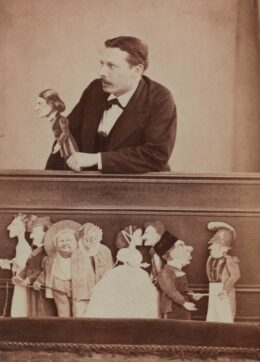
Printed
13 pages
Author(s)
Un caprice
Un caprice is part of the collection Le Théâtre érotique de la rue de la Santé, which gathers some of the plays performed at the Erôtikon Théatron in 1862 and 1863. This collective project led by a group of writers, painters and composers aimed at creating shows in which erotic themes could be freely and crudely addressed. The shows were performed for an audience of about fifty guests, including Paul Féval, Henry Monnier, Champfleury, Duranty and Alphonse Daudet. The puppet booth was placed in a glazed room that was used as an antechamber for the house where Amédée Rolland and Jean Duboys (among others) lived, on 45 Rue de la Santé in Paris. Puppeteer Lemercier de Neuville was the painter, architect, stagehand, director and also one of the authors of the Erôtikon Théatron.
During the first performance, an outraged member of the audience left in the middle of the show. The member in question was Ludwig Wihl (1807-1882), a German poet whom the organisers had led to believe that the puppet theatre on Rue de la Santé performed plays “of refined literary taste”.
The title of the play is a reference to a play by Alfred de Musset (Un caprice, 1837).
A husband’s attempted infidelity fails
Florestant – a young married man – left his wife in their house and went to see Urinette – a prostitute. However, neither Urinette’s touch nor his own imagination succeed in animating the young man. After several unsuccessful attempts, Urinette – desperate and furious – leaves Florestant alone and ashamed.
First performance
Publications and translations
Le Théâtre érotique de la rue de la Santé. Batignolles : 1864-1866.
Le Théâtre érotique du XIXe siècle. Paris: Jean-Claude Lattès,1979.
